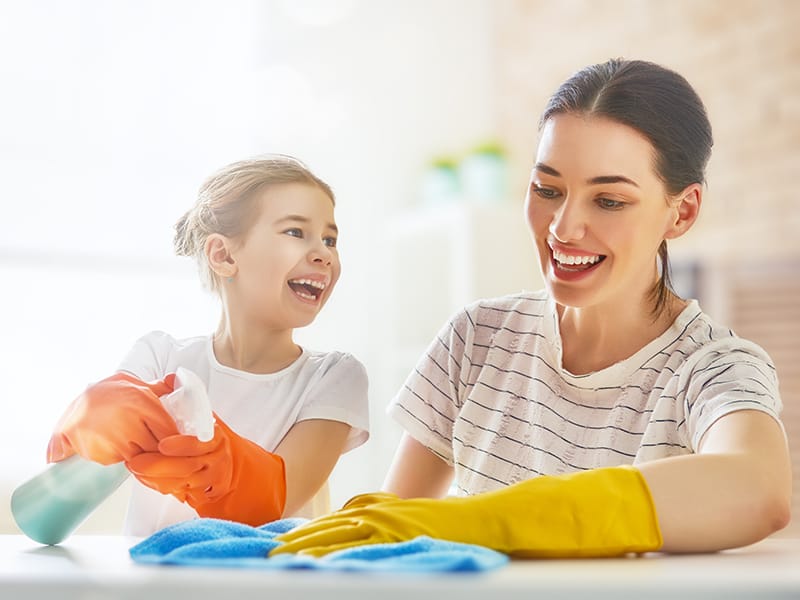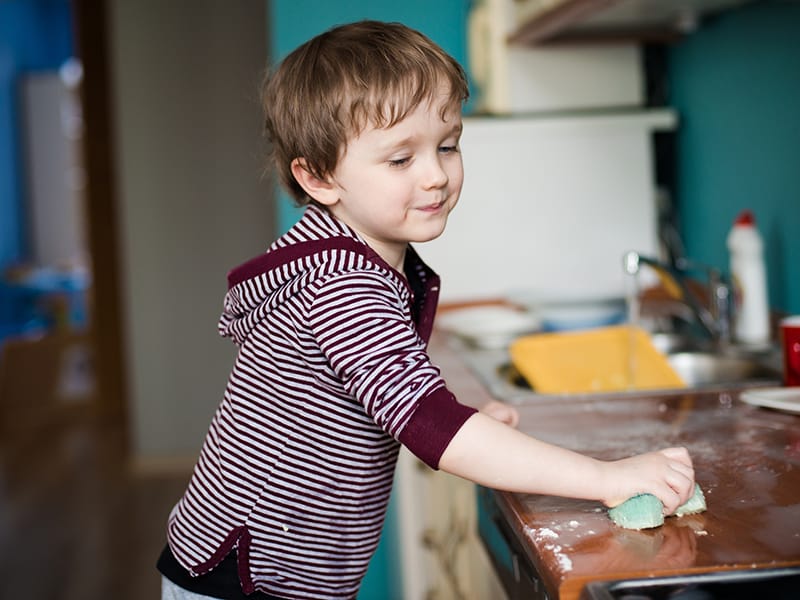
After a year of quarantine with your family working and schooling in place, your home is probably more than overdue for a thorough spring cleaning. It seems like children only multiply the debris and clutter we’ve accrued—which makes this a perfect time to get them involved in the process of undoing them. We talked to blogger Elise Walker of House Gone Sane for some tips about how to teach kids lifelong home-keeping skills while motivating them to mind their mess all year long.
1. Expect it.
No child will grow up to be neat and orderly unless their parents expect it of them. That doesn’t mean that your kids need to be on their hands and knees scrubbing floors on a daily basis, but it does mean that it’s perfectly fine to ask your kids to clean up after themselves after play, to do weekly chores, and to help you out when you need it.
2. Be realistic.
Teaching your children to clean takes time. Be patient with them and yourself. If they make a mess in the process, understand that they are trying and give them a simpler task. Also, be sure to keep safety precautions as well as your kid’s age and ability in mind when asking for help. Walker says she often recruits her kids to put books back on the bookshelf. Never expose your kids to harsh cleaning chemicals or very dusty areas. Protective gloves and masks are a good safeguard when in doubt.
3. Keep it structured.
Just as you might schedule a specific day or weekend to clean, you should also keep your cleaning time limited to an hour or two tops if you expect your children to be active participants. Any more than that and you risk having some disgruntled little helpers.
4. Make a list.
Using a daily list, spring cleaning checklist or deep house cleaning checklist can help not only track all of the tasks that need to be done but it helps give kids a sense of accomplishment which is in and of itself very motivating, Walker says.
5. Let them be the boss.
Kids love to have any autonomy they’re given, so letting them choose their tasks for the day can be a great way to get them involved. Walk them through the home and ask them what they think needs to be cleaned, or show them the cleaning checklist by room and see which tasks they want to take on.
6. Give very specific instructions, one at a time.
Don’t overwhelm. Children–especially those under the age of eight—will need to take one task at a time. Keep the instructions clear and simple.
7. Use visual aids for where things go.
Where possible, you can help your children organize their own things by using signs or labels with pictures. This will help them sort them quickly without having to ask you for help.
8. Make it into a game.

No matter how old your kids are you can make cleaning a fun activity. Put on some music and dance in between chores. If your children are younger buy them some kid-size tools and gloves. Make it into a contest where you race against each other or against the clock to complete your tasks. Hide favorite toys for them to find or create a scavenger hunt to, say, put away all the shoes or loose change in the house. When that fails remember that no kid is going to turn down a spray bottle or the chance to use the hose on a hot day.
9. Don’t make cleaning a punishment.
Well-meaning parents of the past turned regular house chores into a penalty for bad behavior, which only instills negative attitudes about something which actually makes most of us feel productive and good.
“When my kids are more involved with cleaning consistently, they have a better attitude about it because they see that it’s a normal thing we do and they know that they will have a reward or get to do an activity that they like to do when they finish,” Walker says.
10. Turn it into a learning opportunity.
If there was one benefit to COVID-19 and being in lockdown with children, it was that many learned about the importance of cleaning to prevent the spread of the virus. Remind your kids why you clean—watching a few animated videos to get them giggling first won’t hurt.
11. Let them have a say in the castoffs.
If you’re encouraging your children to get rid of their own things, don’t sneak their old toys and clothes off in the middle of the night. Instead, ask them where they’d like to donate them or who they’d like to give them to.
12. Make it a habit.

Almost every cleaning expert will tell you that the idea of spring cleaning—doing one deep cleaning a year—is well-intentioned, but for many of us, it makes more sense to regularly do small cleaning and organizing tasks so that it doesn’t all pile up. The same goes for raising kids who clean. Don’t wait until next year to ask for help again!
“Having regular daily contact with these tasks that you do most days will cut down on some of the spring cleaning which will make it less overwhelming for everyone, but especially when you have kids,” Walker says. “And it teaches them good habits early on.”







